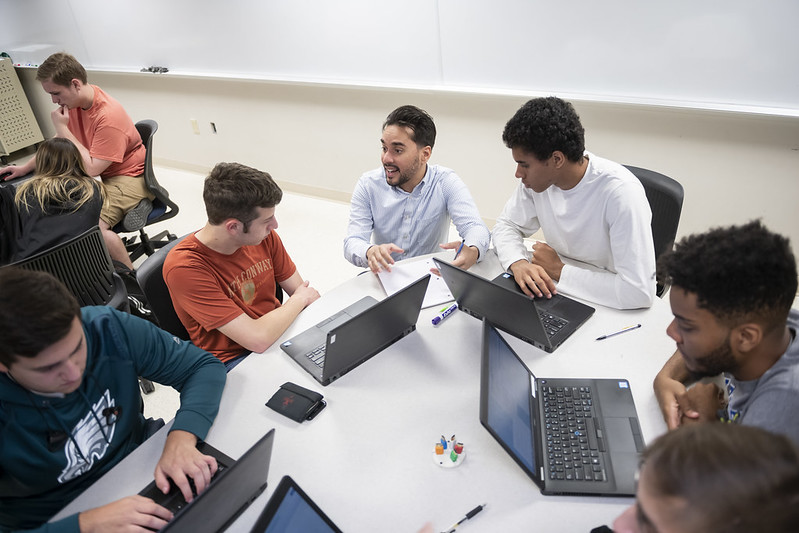
School of
Engineering and
Computer Science
Innovation at the Intersection
The Elizabethtown College School of Engineering and Computer Science believes that future innovations to address our largest societal issues lie at the intersection of disciplines. That’s why we emphasize a broad technical foundation in everything that we do and offer thriving programs that overlap disciplines including multidisciplinary engineering, data science, and mathematical business.
We enrich this strong technical foundation with collaborative projects, personalized advising, and a long tradition of thinking deeply, analyzing critically, and communicating effectively.
Apply Now Visit
Programs
School Resources
At Etown, all doors are open to you – to labs, to faculty, to activities on campus, and to the larger world. Professors here are dedicated to seeing you succeed. Students here are not just great Engineering and Computer Science professionals, but also great athletes and musicians. Engineers here spend semesters abroad. Our graduates have multiple job offers from top companies including Google, Tesla, and the National Security Agency. It all started with the decision to walk through our doors. Check out some of the innovative spaces you'll work in at Etown:
Elizabethtown College's Engineering & Physics labs provide students with state-of-the-art facilities for hands-on learning and research. The Bollman Engineering Design Studio, located in Esbenshade 164, is a hub for student project design and prototyping, fostering teamwork and creativity with its collaborative environment, large whiteboards, and six workstations equipped with monitors for shared ideas and advanced computer-aided design. The Bollman Fabrication Laboratory in Esbenshade 174 offers a $750,000 facility with metalworking, woodworking, and 3D printing equipment, and a dedicated manager to assist students in safe equipment usage. Other specialized labs, such as the Physics Mechanics Lab, Electronics Lab, Robotics & Machine Intelligence Lab, Biomechanics Lab, Mechatronics and Bioelectronics Lab, Water Resources Lab, and Structures Lab, support research and coursework in various engineering and scientific fields. These facilities play a vital role in enhancing students' educational experiences and promoting cutting-edge research.
Elizabethtown College's Computer Science instructional labs provide students with an exceptional learning environment. Three well-equipped labs feature multi-core workstations. Each lab is furnished with a computer for professors, projectors, and Hovercam document projectors, while workstations are configured to boot into both Windows and Linux for exposure to multiple platforms. The Cyber Defense Networking Lab, allows students to practice network creation and security techniques taught in class. Additionally, the Computer Science Department maintains department-run servers for parallel computing, file sharing, web hosting, DBMS servers, and large-scale storage. The Robotics and Machine Intelligence Lab houses the Robotics and Machine Intelligence student club. Computer Science majors also benefit from a dedicated Senior Research Lab and the CS Commons Lounge, fostering student research and collaboration in a space conveniently located next to faculty offices, promoting mentorship and socializing.
Meet the Dean

Dr. Sara Atwood
Dr. Sara Atwood received a B.A. and M.S. in Engineering Sciences from Dartmouth College and a Ph.D. in Mechanical Engineering from the University of California at Berkeley. She is passionate about integrating engineering and the liberal arts, engaging students from historically excluded identities in engineering, and encouraging students to use engineering skills to make the world a better place. Atwood was recently elected to the Engineering Deans Council Executive Board of the American Society for Engineering Education (ASEE).
